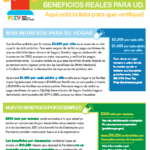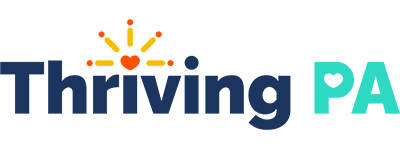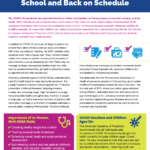Perinatal Health
Fact Sheet: A Perinatal Health Equity Agenda for Pennsylvania - September 2021
This fact sheet provides a Perinatal Health Equity Agenda that includes steps to take to care for birthing mothers. With over one-third of Pennsylvania’s births paid for by Medicaid1, expanding and enhancing access to high-quality care up to one year after birth is a key strategy for mitigating maternal mortality and morbidity.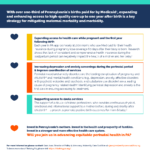
Cost Estimate Tool: Calculating the State Cost of Extending Postpartum Medicaid
This tool was created to be used by policymakers or advocates in other states to estimate the cost of extending postpartum Medicaid coverage in their state.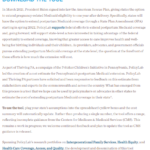
Improving Outcomes: Maternal Mortality in Philadelphia
The Philadelphia MMRC’s current report is based on aggregated data from 110 deaths that occurred between 2013 and 2018. The aim of this report is to describe the current state of maternal mortality in Philadelphia and to highlight the Philadelphia MMRC’s recommendations to reduce it. In this report, maternal mortality will be referred to as either “pregnancy-associated” or “pregnancy-related” deaths. Pregnancy-associated deaths are any deaths that occur during or within one year of the end of a pregnancy. Pregnancy-related deaths are a subset of those deaths which are caused by, related to, or aggravated by the pregnancy or its management. Consistent with how the cases self-identified, this report refers to the population studied as “pregnant and postpartum women.”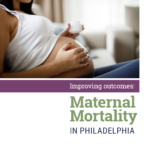
Children’s Health Insurance
Fact Sheet: Health Insurance Matters for Healthy Brain Development in PA Babies and Toddlers - August 2021
This fact sheet highlights an overview on why health insurance matters for healthy brain development in PA babies and toddlers. In the first few years of life, young children need regular access to health care for their healthy development at a time when their brains are growing most rapidly.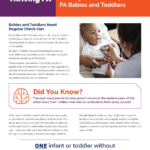
Medicaid & CHIP Connect Kids to Health Care in Every PA Community
Across Pennsylvania, from our rural communities to our urban centers, kids rely on Medicaid and the Children’s Health Insurance Program (CHIP) for their comprehensive health insurance, including more than 1.1 million children enrolled in Medicaid and more than 179,000 children enrolled in CHIP. The three fact sheets in this series show enrollment by Congressional District, State House District and State Senate District.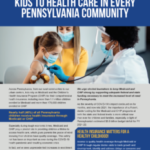
Flyer: Signing Up for Health Insurance for Your Baby or Toddler – March 2021
For children to have the healthiest start possible, they need to be insured as early as possible. By age 3, children should have 12 well-child visits, according to the schedule set by the American Academy of Pediatrics. These regular, preventive visits to the doctor or pediatrician are important to track a child’s growth and development, to provide immunizations and to identify and address delays or concerns. Sign up for health care coverage today!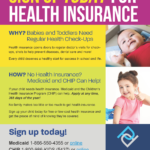
Flyer: Inscríbite hoy para tener seguro médico – Marzo 2021
Porque? Los bebes y Los nines pequenos necesitan controles medicos regulares iEL seguro medico abre las puertas a citas medicas regulares para poder recibir chequeos, vacunas que previenen enfermedades, servicios dentales y mucho mas! Todo nino merece un comienzo saludable para tener exito en la escuela y en la vida.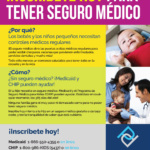
Children’s Lead Screening and Abatement
Fact Sheet: Increased Investment For Lead Paint Remediation In PA Budget
The Lead-Free Promise Project is asking for $12 million in the 2023–24 PA State Budget to Provide low-income homeowners and landlords with the resources to help remove lead paint-based hazards in older properties and strengthen and develop the workforce of lead remediators to better tackle the lead crisis.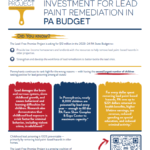
A Resource Guide: Care Management Of A Child With Elevated Blood Lead Levels
This resource guide reports on what to do in case lead-based paint hazards are in children’s homes, including information on who to contact in case of exposure to lead poisoning.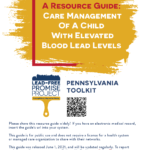
Fact Sheet: Toxic Lead: PA Lawmakers Must Act to Protect Children - July 2021
Lead can seriously harm a child’s health and cause well-documented adverse effects such as damage to the brain and nervous system, slowed growth, development and learning and behavior, hearing and speech problems – which can cause lower IQ, decreased ability to pay attention and under-performance in school often requiring special education services. This fact sheet highlights Pennsylvania’s lead crisis and next steps on ways to make improvements.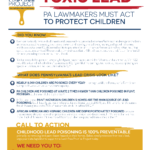
Report: Preventing Childhood Lead Exposure in Pennsylvania - May 2021
This fact sheet highlights an overview of implementing lead remediation practices, and how by investing in children’s health now can prevent Pennsylvania’s children from being exposed to lead and ensure that they are less likely to be involved in the justice system later in life.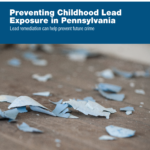
Allegheny County Water System Lead Report - April 2021
The following report analyzes Allegheny County water systems’ operational and communications capacity, public accessibility and information transparency, adherence to drinking water quality standards, and strategies to reduce lead in drinking water exposure.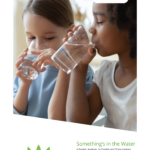
Early Intervention
Supporting Infant and Toddler Early Intervention in Pennsylvania - May 2023
Infant and Toddler EI services are structured to identify and meet the needs of young children in five developmental areas: physical development; cognitive development; communication development(language); social or emotional development; and adaptive skills. Infant and Toddler EI depends on state funding support to ensure that every child needing services is referred to and receiving them.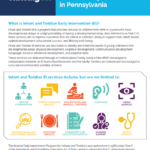
Report: Statewide Advocacy Agenda to Improve Part C Early Intervention Services for Pennsylvania – June 2022
After a year-long planning project co-lead by PPC and the Pennsylvania Association for the Education of Young Children (PennAEYC), this report is a culmination of months of interviews and focus groups with interested stakeholders, a national analysis of early intervention work in other states, and a review of data and current practices in Pennsylvania’s early intervention system.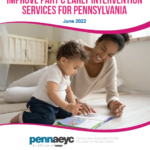
More Resources
Lunch n' Learn PowerPoint Presentation - October 2021
Thriving PA held a Lunch n' Learn webinar in October with state policymakers. In addition to program developers and practitioners, policymakers can help parents build the foundation for lifelong health and learning by ensuring that families and communities have the resources they need to provide responsive, supportive relationships for their young children. The campaign seeks to partner with policymakers so that mothers and birthing people, infants, and toddlers across Pennsylvania can thrive.Pennsylvania Prenatal-to-3 State Policy Roadmap - The Prenatal-to-3 Policy Impact Center at The University of Texas at Austin LBJ School of Public Affairs
The Prenatal-to-3 State Policy Roadmap compares the investments states are making to support children and families. The roadmap is published annually and meant for policy leaders and advocates to guide how each state can implement effective state-level policies and strategies that promote equity and measure the well-being of infants and toddlers.
Fact Sheet: Thriving PA Overview - June 2021
This fact sheet shares an of the Thriving PA campaign, including information on all 4 policy areas and priorities each one focuses on.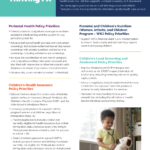
Fact Sheet: ARP Tools for Families - April 2021
This fact sheet highlights important benefits for families from the American Rescue Act, related to topics such as health care, child care, food assistance and more.
Fact Sheet: La Ley De Rescate Americana Tiene Beneficios Reales Para Usted! - Abril 2021
Esta hoja informativa destaca importantes beneficios para las familias de la Ley de Rescate Estadounidense, relacionados con temas como atención médica, cuidado infantil, asistencia alimentaria y más.